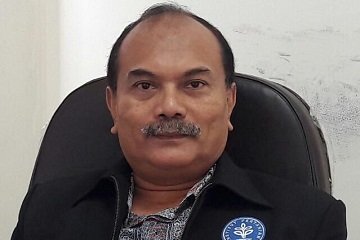Professor Chair Holders of IPB: Three Pillars for Forest Conservation and Sustainability

Conservation biology is the management of nature and of Earth's biodiversity with the aim of protecting species, their habitats, and ecosystems from excessive rates of extinction and the erosion of biotic interactions. Conservation activities include examination, documentation, treatment, and preventative care, supported by research and education. However, in the utilization of a resource sometimes often sounds contradictory to the issue of sustainability. Conserving biodiversity is necessary to reduce the extinction rate and identify an inherent value in nature; the debate hinges on how to prioritize limited conservation resources in the most cost-effective way. Hence the need for sustainable emphasis must be realized in the sense of its existence throughout the ages.
" Almost all wildflowers are fragile and many wilt and perish soon after being picked. Over the years, the repercussions of wildflower picking by unthinking people go far beyond the loss of the flowers themselves. If we just pick up flowers for our own uses, it’s OK. Or, take leaves or flowers from medicinal plants in appropriate size, it does not endanger the environment, even when you kill those plants because they are not productive they are no longer endanger the environemt," said Professor of Forest Resources Conservation Department and Ecotourism, Faculty of Forestry, Bogor Institute of Pertanain (FAHUTAN IPB), Prof. Dr.Yanto Santosa. Further he exemplifies the sex deer ratio of one to five, the birth of males and females together so sex ratio in nature 1: 1. Though ideally 1: 5 then it means there are four males must be harvested so that the balance of sex ratio in nature is reached. "So if we want to think carefully about God it is wonderful to give to be used. God doesn’t say no, do not do …! God wants us everything He created to be used wisely. The "fact" that humanity is hopelessly selfish and greedy, that's the core issue. So if sustainable community is continually adjusted to meet the social and economic needs of its residents while preserving the environment’s ability to support it, adequate resources are available for future generations, "explained Prof. Yanto.
There are limits to the availability of natural resources for use by human beings, and therefore the problems of how natural resources can be allocated effectively and utilized rationally for generation after generation has become a fundamental issue for human society. It is important to consider which values will be optimally utilized. Let's take a step back for a second and think about the use of wildlife in human life, for example, deer antler may be used households, or we can utilize bird swallow nests which are derived from their saliva they worth tens of millions.
Conservation is closely linked to sustainable development. In the concept of sustainable development has three pillars aspects of ecological, economic and social aspects. Professor of the Wildlife Ecology Laboratory of IPB explained in ecological aspects, the development undertaken not to disturb the balance of nature. Disaster events such as floods, landslides and droughts are a symptom that nature is out of balance. In the economic aspect, development should be able to improve people's welfare, not the welfare of a few people. In the social aspect, society should be placed as the subject of development that has a major role so that it can negate or minimize unemployment.
"Therefore, we must guard those aspects of this development. Not only economics are concerned. Economic growth is no longer the sole factor and humans now pay more attention to coordinated development among society, such as human and natural, and past, present and future. Humans have changed the mode of exploiting natural resources from "plundered utilization" to the strategic tracks of "permanent utilization" and "sustainable development". Environmental degradation is the assertion of pressure on the environment which affect our livelihood because the environment is altered. The increase in economic growth is related to an increase in the production and consumption of goods and services; consequently, this may lead to an increase in the multiplied goods of the people and income per capita consumption. “If current trends continue and the world fails to enact solutions that improve current patterns of production and consumption, if we fail to use natural resources sustainably, then the state of the world’s environment will continue to decline. It is essential that we understand the pace of environmental change that is upon us and that we start to work with nature instead of against it to tackle the array of environmental threats that face us. It is not extravagant to say that "The world comes to an end" if all the oil resources are exhausted, because every transport in the world depends on the oil resources. This means that in the future all renewable energy will become the foundation and it needs conservation. "Teeth alone need conservation now. In the old days dentists did not care about it, they just pulled them. Now she practices conservation program. Teeth which can be maintained, will be treated. The earlier your treatment takes place, the faster you will recover. Replacing of teeth loss with artificial denture is not always comfortable, "he said. (Wied)



